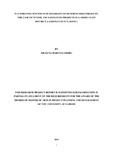| dc.description.abstract | Water plays a significant role in all realms of the human development and provision of clean
and adequate water as universally provided in the Millennium Development Goal remain a
key challenge to governments and development partners. To realize this goal of providing
adequate and clean drinking water, sustainable measures have to be put in place by the
service providers. The study therefore sought to establish factors influencing sustainability of
water and sanitation of donor funded projects in Laikipia East District. The study was guided
by four objectives that is to assess how institutional capacity influence sustainability of water
and sanitation donor funded projects; to establish how beneficiary participation influence
sustainability of water and sanitation donor funded projects; to determine how project
management skills influence sustainability of water and sanitation donor funded projects and
to examine how project monitoring influence sustainability of water and sanitation donor
funded projects. Descriptive survey design was employed to gather information from a
sample size of 194 respondents and 2 key informants from the Ministry of Water and
Irrigation. The study population constituted of the household water consumers and officers
from Ministry of Water and Irrigation. The study used a combination of both probability and
non-probability sampling techniques. The respondents were reached through household
survey while key informants were identified purposively. This study collected quantitative
data using a questionnaire from the respondents and an interview guide from the key
informants. The data was analyzed using descriptive statistics generated from statistical tools
(SPSS V.17.0). The study concluded that; water projects had the capacity to deal with project
related issue despite most projects failing to train the members. Most of the water projects
had the capacity to sustain their projects financially. Members of the water projects
participated in cost sharing through payment of water user charge. Project members
participated towards the implementation, maintenance and management of the water projects.
Beneficiary’s participation contributed to the sustainability of water projects through
enhancing project ownership, completion of projects in time and through ensuring timely
repair and maintenance of the projects. Projects had in place water management committee
which was active and responsive to the needs of the members. Water projects had employed
staff with requisite water management skills which greatly influence sustainability of the
projects. Project sustainability was enhanced by presence of project monitoring system which
the projects had adopted. Projects held regular (on a quarterly basis) project monitoring
meetings which involved the members. Regular project monitoring ensures project
sustainability though helping the project in future planning at the same time enabling the
projects solve water related conflicts, it also enhanced project timely maintenance and repair,
equitable distribution of water and better utilization of project water. The study recommended
that, there is a need to create awareness to the project members on general issues concerning
the water projects. Project vision and mission should form an integral part of the awareness.
The study also recommended that, members of the projects should be included in the
determination of the strategic direction of the project. It also recommended that water
management committees should be trained on all aspects of project management in relation to
water projects e.g. financial management, procurement, operations, tariff setting and record
keeping. It also recommended that, projects should adopt basic but comprehensive
monitoring system for capturing and storing the project’s information to inform the project
management and for future reference. | en_US |

